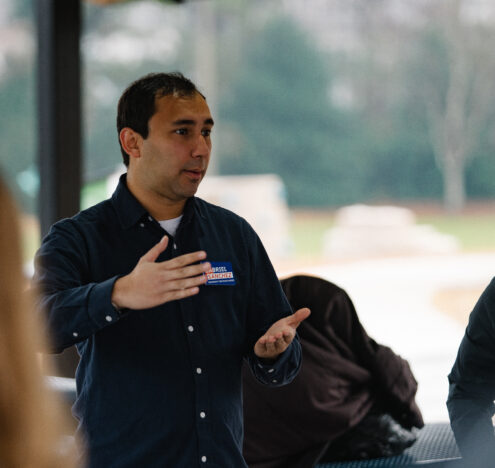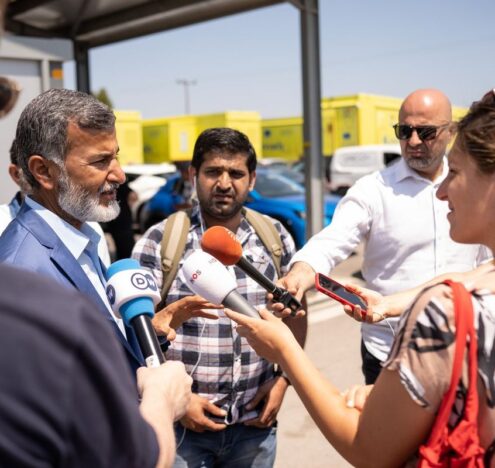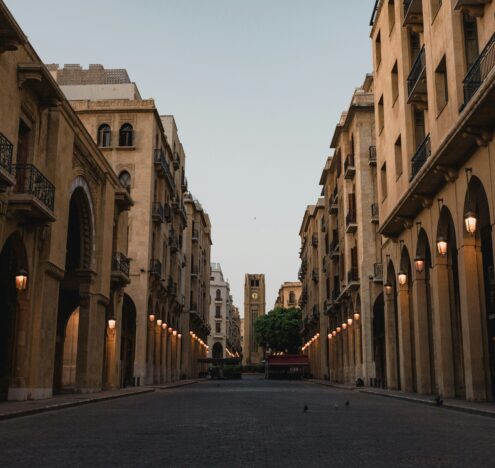When Issa* fled the Syrian war 10 years ago and settled down in Lebanon, one of the first things he did to rebuild his life was shell out $500 on a motorbike and find a job as a delivery worker.
The plan worked, Issa says. He managed to eke out anywhere from $100 to $250 per month working deliveries for a restaurant in Beirut. Life went on. He got married, had children, and found cheap housing in Hamra, a bustling central district of the capital city where he says the diverse populace made him feel safe from potential anti-refugee backlash.
All the while, he drove that same $500 motorbike.
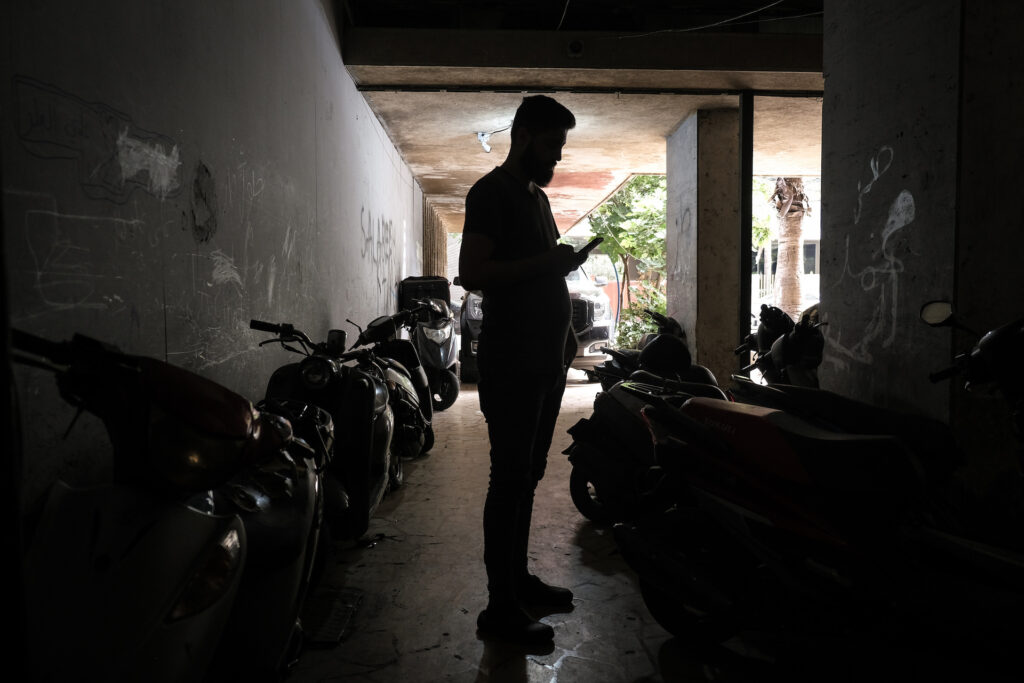
That all came to a halt this past March. According to Issa, Lebanese authorities stopped him at a roadside checkpoint in Beirut and impounded his motorcycle, which he was driving without a proper registration. The seizure was part of a broader government campaign since late last year to impound unregistered bikes.
“I’m in Debt Now”
Without the bike, he can’t work deliveries or move around as easily, as public transportation options are piecemeal and pricey. Instead, Issa simply spends his days hanging out on a street corner in central Beirut, hoping for a new job. One afternoon in May, I find him nursing a cigarette outside a popular bakery staffed by Syrian workers.
“I’m in debt now,” he tells me — now he’s up to his ears in $1,800 that he owes his friends for helping him cover his rent, electricity, and other bills.
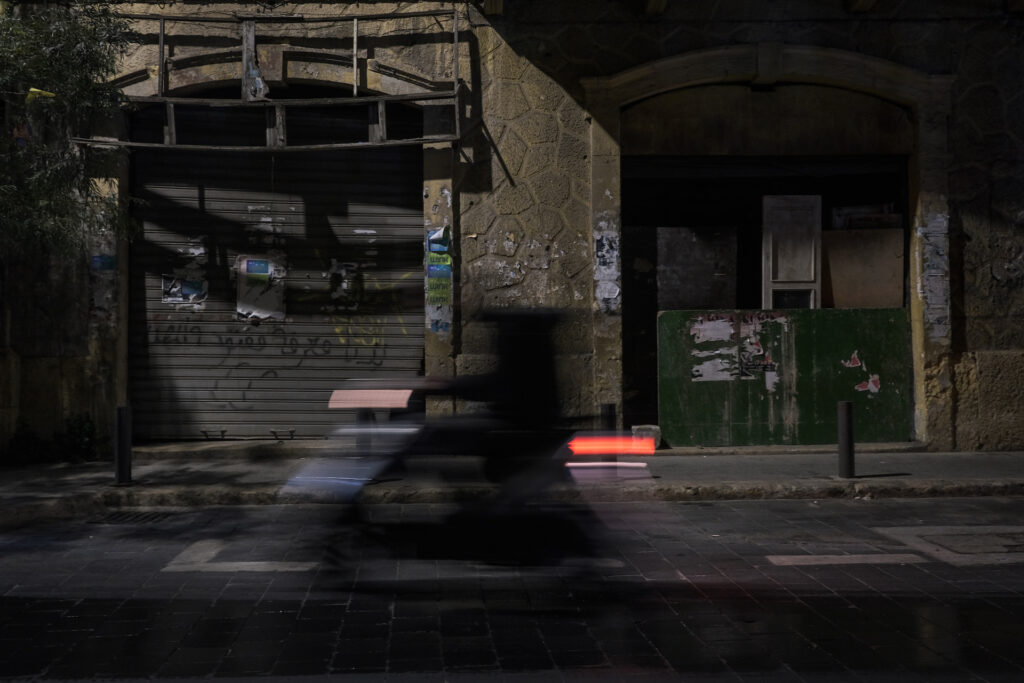
At only 30 years old, Issa looks exhausted beyond his years, with two toddler-age children and a pregnant wife waiting at home in a nearby informal apartment block. He hopes to get his bike back and properly register it so authorities don’t impound it again, but the registration office has been closed off and on for months.
Targeting Motorcycles
Thirteen years into the Syrian civil war, an estimated 1.5 to 2 million Syrians like Issa now live in Lebanon — roughly half of them as United Nations-registered refugees. Many of them have found much-needed work as delivery drivers, an often informal job that requires having a motor scooter and not much else.
This line of work has made motor scooters a vital part of many Syrians’ livelihoods, an extension of their bodies as they weave through cities hostile to them aboard their bikes.
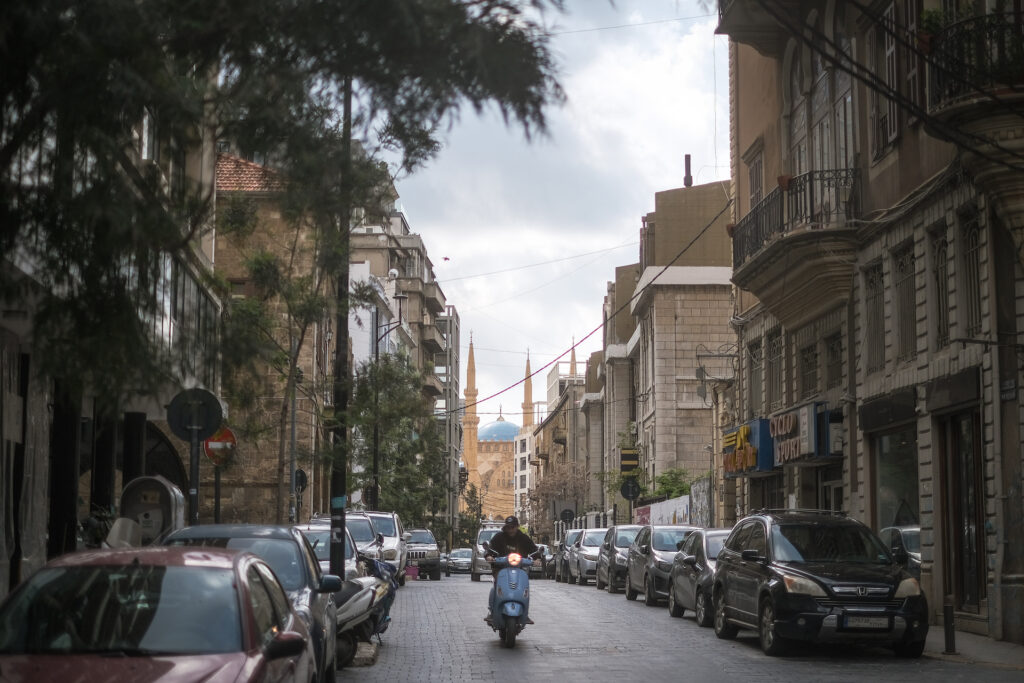
But most of the men cannot legally register the motorcycles, as they are in Lebanon without proper residency or refugee papers. Others lack the money to pay for registration. On top of that, recent months have seen an uptick in violence, evictions, and even deportations against Syrians in Lebanon, especially after the killing in April of a Lebanese right-wing Christian politician that many people blamed on Syrians.
At the center of the recent crackdown: motorbikes. Since I began speaking with Syrian delivery workers last year, they’ve been telling me — over and again — that despite looking out for each other and warning one another of rolling checkpoints on the roads, authorities have been seizing their motorbikes in droves. And the checkpoints are hitting where it hurts: “My motorcycle is everything,” they say time and again.
Police at one traffic stop in Beirut allegedly even killed one Syrian man and wounded another who had been riding together on a shared motorbike.
Losing Lifelines
The men say they feel their nationality has landed them in the crosshairs — and because many assume blue-collar workers, such as motorcycle delivery employees, are Syrian.
“They stop Syrians and even detain them” at the road checkpoints, Hassan, a former delivery worker, told me back in November. He started an informal Syrian delivery workers’ union via a WhatsApp group during a strike two years ago. “Lebanese, Palestinian — no. Allah maaon, off they go.”
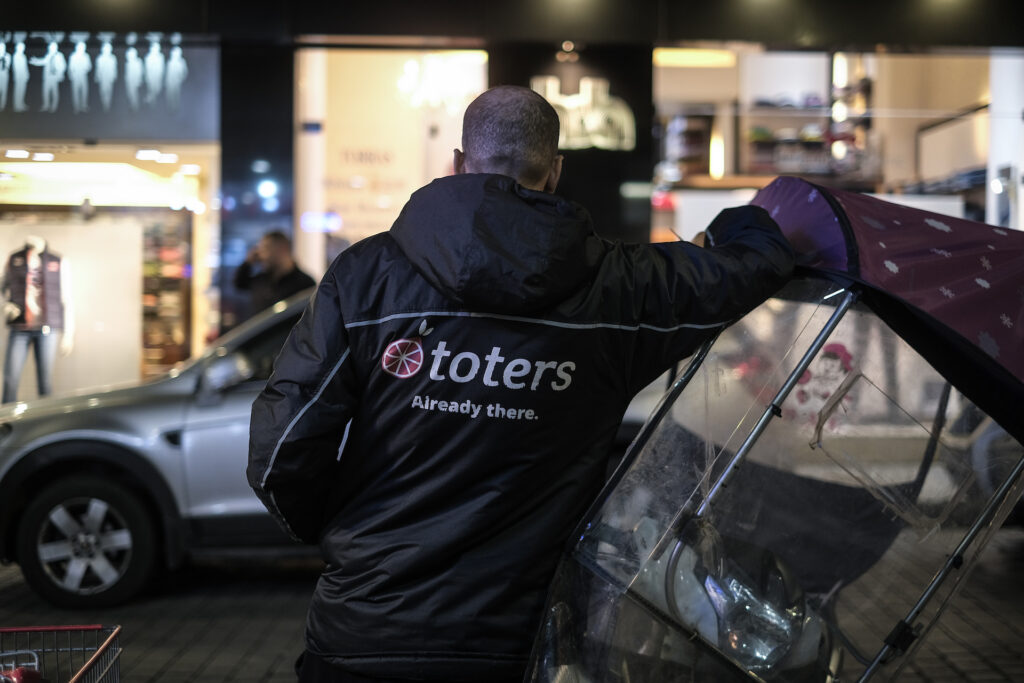
On one recent afternoon in the Hamra district, not far from where I meet Issa, a truck trawls slowly down the main commercial thoroughfare, municipal workers adding seized motorbikes to its bed as it chugs along.
Lebanese officials have said that the roundups are to clamp down on dangerous, chaotic traffic conditions and crime. The Internal Security Forces (ISF), Lebanon’s police force, enacted a new “security plan” in May that has seen scores of new checkpoints come up across the capital, which it said was aimed at catching illegal motorcycles and other vehicles.
They stop Syrians and even detain them.
– Hassan
By late May, authorities had seized 1,654 motorbikes under the new measures, Interior Minister Bassam Mawlawi said in a televised interview on local station LBCI. This plan is “necessary and requested by all Lebanese to ensure their safety,” he said.
Meanwhile, without the proper residency papers or the money to legally register their bikes, some Syrians say they are now losing one of the few lifelines available to them.
Shrinking “Freedom”
In one hilly suburb north of Beirut is a branch of a popular grocery delivery service with about a dozen or so motorscooters standing at attention out front.
There are about 10 or so workers chatting and enjoying smoke breaks at a time, while their colleagues stream in and out to make delivery runs as orders come in through a mobile app. Most of the workers are from Syria. They tow bags of toilet paper, drinking water and vegetables in plastic crates strapped to their motorcycles — dubbed motseeklat in the delivery guys’ work lingo.
A talkative guy, who asked not to be named, has the spiffiest motseek of the group, they tell me through smiles — it cost several hundred dollars and he bought it just two days ago. There’s a gold-painted ornament of a pouncing lion adorning the front wheel, and cling film still covering the shiny paint job.

Blinged-out or weathered from years on the road, the motorbikes are “everything” for the workers, says Muhammad, another one of the delivery guys taking a rest in between runs. Like the others around him, Muhammad, who’s in his forties, lives in a suburb just north of Beirut.
According to Muhammad, this area is — slightly — safer for him and other Syrian delivery workers, as there are fewer roadside checkpoints where authorities could potentially impound their bikes.
He says his own motorcycle, which he bought years ago and registered legally in his name, is his livelihood. The delivery work he’s able to do with the bike is his “freedom.”
“It’s the road, you can move from place to place, with nobody above you or in charge of you.”
“No Foreigners”
Nevertheless, Muhammad says still takes care to not work too long after nightfall, especially as some customers live in a nearby village where a public banner says “no foreigners” are allowed in after 8 pm.
Suddenly: the loud screech of rubber tires, and the unmistakable sound of metal crashing into concrete on the busy highway just steps away from us.
The guys all jump up to see what happened, and I join them, walking over to a highway median next to a ramp. There, a young man in another company’s delivery uniform leans against the median panting for air, his left arm bleeding. A car hit him. He’ll be alright, but his bike is strewn yards away across the road. I’ll later find out he had just delivered lunch to the building right above us.
I return and find Muhammad resting on a bench right where I left him.
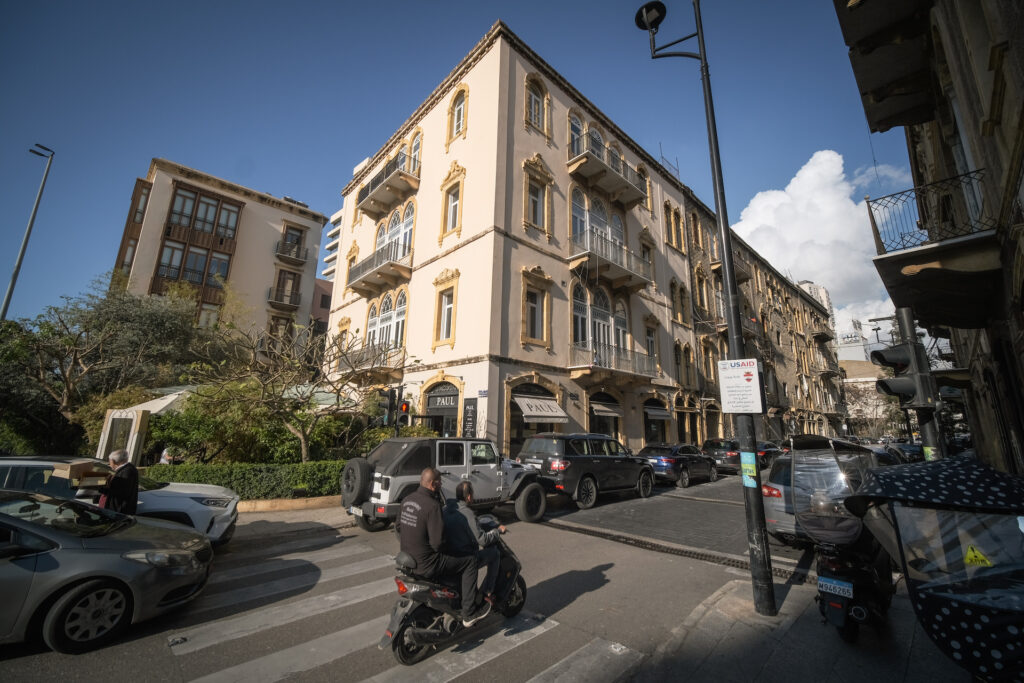
Do road accidents ever worry him? “I’ve been in five accidents,” he says, the most recent about a year ago in a busy Beirut suburb. Luckily, he never had a serious injury, and his employer covered the hospital care costs of the most recent accident, he says. One of his colleagues at the grocery company, however, died in an accident last year.
“I’m more scared of the checkpoints, though,” Muhammad says.
Delivery work on his bike is still better than any other options, despite both the legal and physical risks, he figures. The pay is better thanks to tips from customers, and he has no immediate bosses or superiors telling him what to do. So, for now, Muhammad keeps braving the road.
“We keep going. What else can we do?”
Stuck in Limbo
Back in Beirut’s Hamra district, Issa slumps home from the bakery where I met him. He passes rows of neighbors’ motor scooters parked in the garage beneath his apartment building. Bike after bike strapped with boxes and crates, ready for delivery work that he can no longer do. Upstairs his two children play with a football in their one-room flat.
His own bike, he says, is still hidden away somewhere in a government storehouse, waiting for the day he might be able to cough up the $400 needed to formally register it.

Until then, seeing everyone else’s bikes down here is “difficult” for him. One man in a pizza delivery uniform revs up his own bike and waits for Issa to move out of the way so he can head to work.
“It’s hard to see all of this, while my motorcycle is at the pound.”
*Surnames have been omitted from this article at the interviewees’ request, to protect their safety amid increased threats against Syrian refugees.
** All photos by João Sousa. Sousa is a photojournalist based in Lebanon and focused on social issues.
















